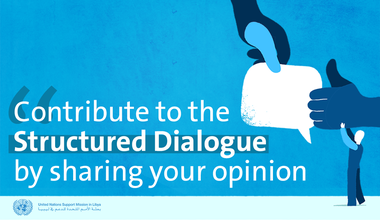Mental health and psychosocial support programme in Libya: “Building Back Better”
But a new mental health programme led by the Ministry of Health and WHO, based within the National Center for Disease Control (NCDC/MOH), is set to transform Libya’s institution-based approach to a community-based approach to mental health care, making mental health services available to the most remote and under-served areas of the country.

WHO/Fahmy Bahgat
This major shift in direction taken by Libya follows WHO-supported consultations with the Ministry of Health and other stakeholders in 2011, that identified mental health and psychosocial support as a priority area needing urgent action in Libya’s post-conflict recovery and rebuilding phase.
Post-conflict mental health needs
During 2011, hundreds of Libyans with either war-related symptoms, or pre-existing mental disorders aggravated by the emergency, flocked to the few existing mental health facilities seeking treatment from a system that was unable to cope with their urgent needs.
Misurata, Libya’s third largest city, was the scene of some of the heaviest fighting. The city remained under siege for months and was increasingly targeted by shells and missiles. Misurata was also historically a city with no mental health services at all, not even a psychiatrist.
“Mental health services in Libya had been extremely inadequate and couldn’t meet the urgent needs of people who suffered during and after the conflict,” says Dr Baderdin Najjar, Director of Libya’s National Center for Disease Control/Ministry of Health. “This had created a huge challenge to the already worn-out health system.”
Focus on remote and under-served regions
In Misurata, long-term mental health and psychosocial interventions had to be established from scratch. In early 2012 a project was launched to bridge Misurata’s urgent mental health gaps, while acting as a guiding pilot project for other areas of the country during the post-conflict reconstruction phase.
Two other remote geographic areas, the Sebha and Nafusa mountain regions in the south and west of the country, also benefit from the new emphasis on community-based mental health care. The deployment of mobile mental health units allows residents for the first time to access specialized mental health care.
Education for better mental health services

National Center for Disease Control / Abd el Razak ben Halim
One consequence of the low priority previously given to mental health services in Libya’s public health system was an almost total lack of mental health-care training.
This has now changed: The NCDC/MOH programme is prioritizing building the capacity of professionals from a range of disciplines to cope with mental health issues. This includes the launch of a diploma for general practitioners in primary mental health care and a diploma for psychologists in clinical psychotherapeutic interventions for ex-combatants and their families. In addition, the programme is now training psychiatrists, nurses and social workers as well as running advocacy campaigns to raise awareness of mental health issues among the public and to combat related stigma.
“The real success of the MOH/WHO mental health programme in Libya so far has been through ensuring national ownership of the programme,” says Dr Jean Jabbour, WHO’s Representative in Libya. “In the post conflict phase, the programme immediately started relying on national experts, with technical support from WHO locally at country level and in communication and collaboration with the regional office and HQ.”
Libya’s goals are ambitious. It hopes that soon, a new generation of mental health workers will be able to deal with the country’s complex post-conflict needs. Already in September, an outpatient (“day-care”) mental health centre will be opened in Tripoli, and in December the NCDC/MOH will launch a four-year mental health strategy for 2015-2019.
 United Nations Peacekeeping
United Nations Peacekeeping UN
UN









